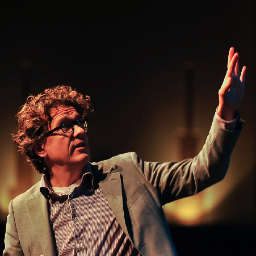“We will wait a while until everyone has dialed in. Can you see me that well? Am I understandable? I hear an echo. “The same comments all the time, the same chaos, it is the new bingo. Where video calling used to be an exciting new experience, it has now become a tiring ritual for many. Even if a video call meeting goes smoothly, it still turns out that people are exhausted. It sucks energy.
You and your window
During a video call, we need to focus more on the other person than we normally would. It is hard work to digitally perceive non-verbal cues such as facial expressions, voice pitch and body language. We must also interpret existing and new social signals in a different way. People who used to wear suits now wear polos. Hand gestures are less visible, but you can continuously monitor the faces of the others. And what does it mean that your colleague’s laundry basket in the background is so full? Our only space for interaction is a computer window, where the personal space is nil, making us more vulnerable to negative feelings. In addition, every video call with a colleague, friend or family member is a memory of a world that no longer exists. Every time this confrontation brings with it all kinds of emotions. Unsurprisingly, all of these online video encounters lead to fatigue, headaches, prickly eyes, blurred vision, and other neurological conditions.
Damping the emotional triggers helps
According to Stanford University communications professor Jeremy Bailenson, we’re getting exhausted because we’re staring at each other all the time. We constantly read each other’s emotions and are therefore automatically in a fight or flight mode. Based on his research, he advises to use the camera differently. Those personal views in the kitchen of your colleagues, no matter how nice, also cost energy. It is better to fix the camera on an image, choose a different camera setup or turn the camera off completely. An alternative is to work with virtual avatars: you see the person, but there are far fewer emotions to be observed. This damping of the emotional triggers makes digital meetings less tiring.
Digital FOMO-fobia
At the beginning of the crisis, we did not want to miss an online meeting, coffee moment, Friday afternoon drink, birthday party or pub quiz. And let’s face it, we didn’t have to miss anything, because we were at home anyway.Currently, an estimated 2.6 billion people – a third of the total world population – are home-ridden by the coronavirus. That makes the imposed lockdown the world’s largest psychological experiment ever. The World Economic Forum expects a second epidemic of psychological disorders by the end of 2020, ranging from bad mood, insomnia, stress, anxiety, anger, irritability, emotional exhaustion, depression to post-traumatic stress symptoms. These expected effects on the psychological condition of people who remain in long-term quarantine are now also found in the first reports from China. Paradoxically, there is therefore a risk that social distancing will lead to more health problems in the longer term.
Logging out of social in the lock-down
A few weeks ago, professor Witte Hoogendijk, head of the psychiatry department of Erasmus MC, advised to turn off social media. That was pre-corona an important weapon against burnout. He also sees benefits in the “corona mode” we are currently in. We need less because we can do much less. But with all those video calls, we achieve the exact opposite: our stress response system is set on non-stop, we are constantly on and that eventually makes us crazy. The global pandemic has accelerated the digital transformation. Combined with the one and a half meter society, a completely new way of life is enforced in a few weeks. So it is not surprising that people complain about a “Zoom burnout”. We should take these complaints seriously, look at the “why” behind the energy loss, set clear limits, not plan all day with calls and turn off the camera during a video call meeting. In this way we are better able to watch over our own mental health. The doctor’s advice is therefore to occasionally just pick up the phone again and again.

 English | EN
English | EN 